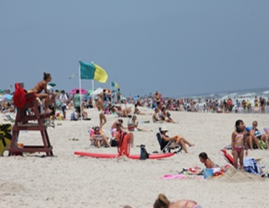Beach Closing/Advisory Policies

The New Jersey Department of Health (NJDOH) is responsible for setting sanitary and safety regulations for public recreational bathing beaches.
Recreational beaches are subject to the opening and closing procedures of the
Public Recreational Bathing rule (N.J.A.C. 8:26) ![]() .
.
Each week recreational beach water quality monitoring is performed at approximately 195 ocean and 25 bay monitoring stations along the coast of New Jersey. Samples are analyzed for the presence of Enterococci, a type of bacteria found in animal and human waste that is an indicator of possible poor bathing water quality. The New Jersey State Sanitary Code requires that the concentration of bacteria not exceed 104 colonies of Enterococci bacteria per 100 milliliters of sample. An exceedance of this concentration may be harmful to human health (see our Health Risk Information section). When a sample exceeds the state standard, a swimming advisory is issued and additional sampling is conducted and continues each day until the sample result is below 104 Enterococci/100 mL. If two consecutive daily samples exceed the standard, the bathing beach closes until sample results are below the standard. In addition to bacteria monitoring, regional health or enforcement agencies may close beaches at any time at their discretion to protect public health and safety.
There are two categories of actions that take place when water quality exceeds the recreational standard; advisories and closings.
Any initial sample that exceeds the state standard requires that the local health agency issue a swimming advisory at the bathing beach where the sample was collected. Swimming Advisories warn the public of potentially unhealthy water conditions. Additional sampling is conducted until water quality results are again within the standard.
Beaches are closed if two consecutive samples collected at a bathing beach exceed the state standard. Beach closings remain in effect until subsequent sampling indicates bacteria levels are again below the standard. The closure applies to water activities like swimming, wading, and playing in the water. Other beach related activities like sunbathing and walking on the beach are unaffected. Health authorities may close beaches at any time for any reason as a precaution in order to protect public health. Precautionary beach closings can be caused by wash-ups of debris or trash or household medical products, breaks or spills to sewer lines that may discharge to a bathing beach, extraordinary weather events, or any other condition that may affect public health. If a health authority closes a beach due to a wash-up of debris, they may limit all access to the beaches, if needed, to protect public health.


![[Banner] [Banner]](/njdep_common_files/images/beachbannernofade.png)








